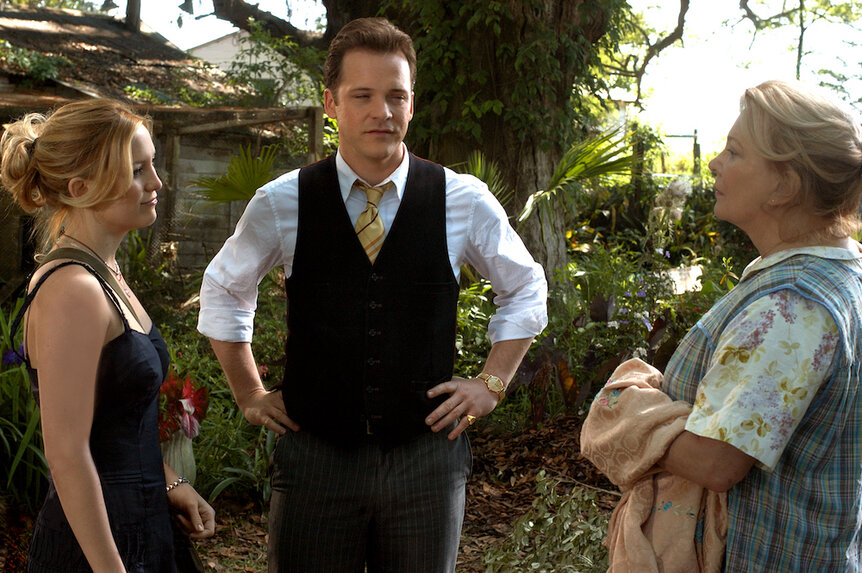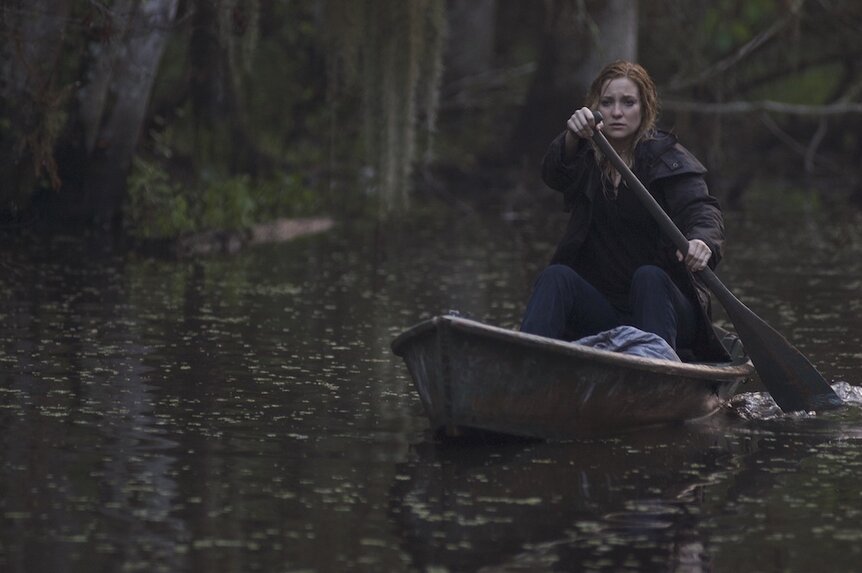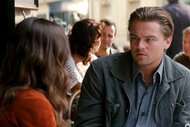Create a free profile to get unlimited access to exclusive videos, sweepstakes, and more!
This Underrated, 2005 Kate Hudson Horror Film Channeled Get Out 12 Years Before Get Out
With Halloween just around the corner, it's high time to revisit this underrated gem.

With Halloween just around the corner, it's high time you revisited the underrated horror gem that is 2005's The Skeleton Key (now streaming on Peacock). Written by Ehren Kruger (Top Gun: Maverick) and directed by Iain Softley (Inkheart), the supernatural thriller centers around Caroline Ellis (Kate Hudson), a hospice caregiver who agrees to look after an alleged stroke victim, Ben Devereaux (John Hurt), living at a creepy old manor house located deep in the bayous of Louisiana with his eccentric wife, Violet (Gena Rowlands).
As the story progresses, Caroline begins to suspect that something is amiss with Ben and Violet Devereauxs, sending her down a rabbit hole of magical spells and the South's heinous past of race-driven violence. "I was gripped by it and it kept me guessing all the way through," Softley tells SYFY WIRE over Zoom. "I thought it had a stunning ending, which is half the battle and I thought it was very clever. I also liked the fact that it was [very] much rooted in a particular geographical place; it was rooted in New Orleans and the folklore of hoodoo, which underpins the whole story ... It used that folklore to really tell a story about the revenge of the Black servants on their masters."
The Skeleton Key director unpacks production secrets from underrated horror film
While it may share a lot of the same vowels as its more well-known cousin, hoodoo is not the same as voodoo. "Voodoo came from West Africa via the Caribbean through the slave plantations and was a religion that substituted some African gods and mixed them with Christian gods and devils," Softley explains. Hoodoo, on the other hand, "is really an amalgamation of a number of folkloric and superstitions beliefs in the power of certain substances, rituals, and incantations to cast spells that can actually have a direct effect on the outcome of somebody's life," the director adds. "It draws upon some African American folklore tradition and does take something from voodoo, but there is [also influence from] Native American and European folklore, as well as a Pagan belief in spells."
Rooted in the world of rational thinking, Caroline comes to the conclusion that Ben's post-stroke paralysis is nothing more than the psychosomatic result of the man's belief in the power of hoodoo. Despite having almost no dialogue throughout the 104-minute runtime, Hurt (who passed away in 2017 at the age of 77) gives a haunting performance, almost solely through the use of looks and guttural noises, completely selling Ben as a desperate prisoner trapped in his own body. He's a captive, alright, just not in the way we think.
"A lot of people thought it was a bit contrary to hire an actor who's known for, amongst other things, his amazing voice," Softley admits. "But he liked that. He thought that was amusing and he thought that was a challenge for him because it was something he'd never done before. He and Gena Rowlands got on incredibly well, they became really good friends, and he loved the world. John was a very international traveler throughout his life. He was very adventurous and very interested by challenges. And so, he loved it. He was a really enthusiastic traveler with us. I knew that I needed somebody who had that power and that presence to make such a minimal role function in the way that it needed to. He was brilliant in it and I became a good friend of his as a result."
Caroline initially claims not to believe in magic — one must whole-heartedly believe in hoodoo for it to work — and collaborates with the Devereauxs' estate lawyer, Luke Marshall (Peter Sarsgaard), in an effort to remove Ben from Violet's care. Caroline's adamant skepticism is slowly worn down until the movie's humdinger of a twist: magic is very real and the couple she's been living with for all this time are not who they say they are. Softley compares The Skeleton Key to his 2001 feature, K-PAX, which also explored a tug of war between logic and the unexplainable via the relationship between a psychiatrist (Jeff Bridges) and a mental patient (Kevin Spacey) purporting to be an extra-terrestrial.
"In both films, you have a rationalist at the center," the director says. "We all have a suspicion that maybe the rational world doesn't explain everything. But it was very important to me to preserve [Caroline's] defiance for as long as possible because then that makes the battle between her and the Gena Rowlands character, who is trying to convince her of the existence of the paranormal. That was really the basis on which we proceeded ... I think it's a very natural reaction for people, even those that proclaim not to believe in the paranormal or a world outside of the rational, to still become scared by things we can't explain."
After keeping the audience guessing for almost two hours, Kruger's screenplay pulls out the rug: a pair of hoodoo practitioners and healers — Papa Justify (Ronald McCall) and Mama Cecile (Jeryl Prescott) — have been switching bodies with youthful individuals as a way to prolong their lives for close to a century. They once worked as servants for a cruel white banker named Thorpe, who got his comeuppance when Justify and Cecile traded bodies with the man's children before Thorpe had them brutally lynched.
Luke Marshall's soul has been inside Ben this whole time, allowing Justify to help pull the strings in the body of the sympathetic attorney. Caroline first needed to be convinced of hoodoo's efficacy in order for Cecile to make the swap as well. The stroke-like symptoms are caused by a special elixir used to keep the victims quiet, docile, and unable to explain what has happened to them (not that anyone would believe such ravings, of course).
"The story had the roots of that idea of the horrific brutality of the white plantation owners in lynching their servants. What happens in the film is, that by their own hand, revenge is acted on them," Softley says of the film's weighty subtext. "In a way, it’s a story where justice prevailed."
The Skeleton Key was shot on location in Louisiana at the insistence of its director. "I made several trips to New Orleans and decided that it was such an important environment and location for the film story," he explains. "I wanted to shoot as much as possible there for creative reasons. I wanted all of us to be immersed in that world and that wasn't our initial sense." The studio wanted the main bulk of production to take place in Los Angeles, but Softley convinced them to reconsider during a hiatus caused by Hudson's first pregnancy. "I think the film benefited not just from the location, but from myself and the crew and the heads of department really familiarizing themselves and making contact with a lot of advisors in the city that enabled us to bring authenticity to it."
Working closely with production designer John Beard, costume designer Louise Frogley, and cinematographer Dan Mindel, Softley aimed to make New Orleans (and Louisiana at large) feel like another character in the film. He cites the photography of William Eggleston and Nina Golden as major influences on its aesthetic. The cornerstone of the entire shoot turned out to be a real-world plantation house, which was originally "inaccessible" to the filmmakers due to some sort of feud within the family that owned it. The landowners ultimately relented, allowing the movie to serve as a proverbial olive branch between the fighting family members.
"I was really delighted to hear — I hope it's true — that as a result of the film being made, the peace was made between the people who were having arguments with each other," Softley explains. "We did scenes outside at night and again, there might be a practical production argument for doing those in the studio, but we were able to shoot much more in chronological order, which I think benefits the performance from the actors. There was also a flow in the production and it meant that if I wanted to conceive a shot where we were starting inside the house and moving outside the house, of which there are a number, it's just more organic and more believable and more authentic. Plus, we were living there and were just seeped in it 24 hours a day. I'm sure that subconsciously affected things like the tone and the imagery that I employed in the film."
Was Jordan Peele's Get Out inspired by The Skeleton Key?
A little over a decade after The Skeleton Key arrived on the big screen, comedian Jordan Peele made his directorial debut with Get Out (stream it here), a thrilling critique on racial divides in the United States that nabbed the burgeoning filmmaker an Academy Award for Best Original Screenplay. One could even say that Peele's film plays like a mirror reflection of The Skeleton Key, particularly with regards to "the idea of people seeking long life by possessing or switching into a body of somebody from the other race," says Softley, who actually received a heads up on the similarities between the two movies from an unnamed Blumhouse producer ahead of Get Out's theatrical debut.
"It's not unprecedented and you could argue it's legitimate that one film is influenced by another. It happens all the time and the best people do it," he concludes. "I think it's a good film, by the way, but it was particularly strange, having been told in advance that I was going to feel a little bit annoyed with them that it was so close. That was one of the producers who admitted that. Then that was the last time I heard that admission, but that's water under a bridge. It always tickles me when people get outraged on my behalf."
The Skeleton Key is now streaming on Peacock.
Originally published Sep 29, 2022.




























